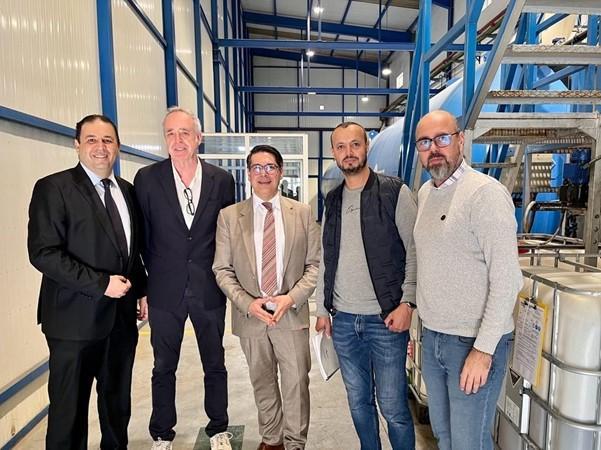Morocco textile firm Tintcolor’s innovative water treatment methods clean up pollution and attract big brands focused on sustainability
In August 2018, Moroccan textile manufacturer Tintcolor received an alert from Amendis, Tangier’s water utility company. Pollution at a beach close to the famous Caves of Hercules had been traced back to Tintcolor’s plant, which was discharging up to 700 cubic metres of water each day with minimal treatment.
“The old chemical plant was just a basin,” says Abderrahman Meziati, maintenance director at Hallotex, the Spanish company that had recently bought Tintcolor. “The water was treated with bleach for decolouration, and controlled visually with hydrochloric acid, then discharged into the municipal sewage system.”
Tintcolor’s bleach overpowered the bacteria used by Amendis in its treatment plant and the polluted water was discharged into the ocean. The company knew it had to act fast or shut its plant.
Within three months, TintColor installed a modern biological treatment plant costing €500 000. The European Investment Bank and Agence Francaise de Développement contributed €300 000 through Bank of Africa (which was then known as BMCE), supported by the European Commission under the Ligne Bleue, a programme to support wastewater treatment projects for industries with high water consumption in Morocco.
A leap towards cleaner water
The new 250-cubic-metre cooling tank, imported from Spain as a single piece featured an oxygen supply, modern pumps, and quality stainless steel equipment.
In the new tank, a dissolved air flotation unit separates solids and water. It then filters wet sludge from solid biological residues. The wet sludge is mixed with lime to harden it, then processed through a filter press to separate the solid-liquid mixture. The solid is discarded as waste, while the liquid is discharged into the sewer system.
Meanwhile, the biological residue is treated with bacteria to consume the residue and dirt from the water. The solid residue consists of harmless, dead bacteria.

Inside the biological water treatment facility, from right to left: Xevi Mans (director, Tintcolor), maintenance director Abderrahman Meziati, EIB Vice President Ricardo Mourinho Félix, Jordi Bonareu (CEO, Hallotex), Ahmed Benyahya (head of financial institutions, Bank of Africa)
Sustainability practices good for business
The new treatment plant successfully treats 60% of the water, which is sent to Amendis for a second treatment before being reused for urban landscape irrigation. With the improved treatment process, Amendis lowered its price from 11 dirhams (€1) to 8 dirhams (€0.70s) per cubic metre of water, a significant savings for Tintcolor, which was founded in 2010 by two Spanish entrepreneurs.
In addition, the company increased its production capacity from 8 tonnes per day to 12 tonnes and hired 25 more people to manage the increased demand.
“Now we are at best practice in terms of cleaning the water,” says José Manuel Caballero, Hallotex’s chief financial officer, who joined in 2020. “Our goal is to reach 100% clean water, and we're continuously working towards that.”
Hallotex will install additional water treatment equipment at Tintcolor to remove the remaining 40% of polluting particles from its water outflow, allowing it to be reused in the dyeing process. This will result in a daily water saving of 500 cubic metres, or one Olympic swimming pool full of water each week.
Hallotex plans to invest a further €5.5 million to build a new biomass plant to reduce Tintcolor’s dependence on fossil fuel and to install solar panels.
Embracing a circular economy
Better waste treatment is obviously good for the environment. It also makes good business sense. These days, potential clients are focused on environmental, social and governance (ESG) issues.
“With this new treatment plant, we can take on more clients and customers,” says Xevi Mans, Tintcolor’s director. “Clients will check ESG criteria. But customers also want the company to move forward with this new process.”
Until 2020, Hallotex primarily supplied Spanish company Inditex. But in 2020, the company diversified its client base, supplying H&M, Patagonia and Mango.
Hallotex Chief Executive Jordi Bonareu adds that sustainability has become more important in industrial companies. “During and after COVID-19, everything changed around supply chains and the dependency on China,” he says. “Our goal is to meet the demands of our diversified client base and customers, while ensuring the traceability and sustainability of our production process."
